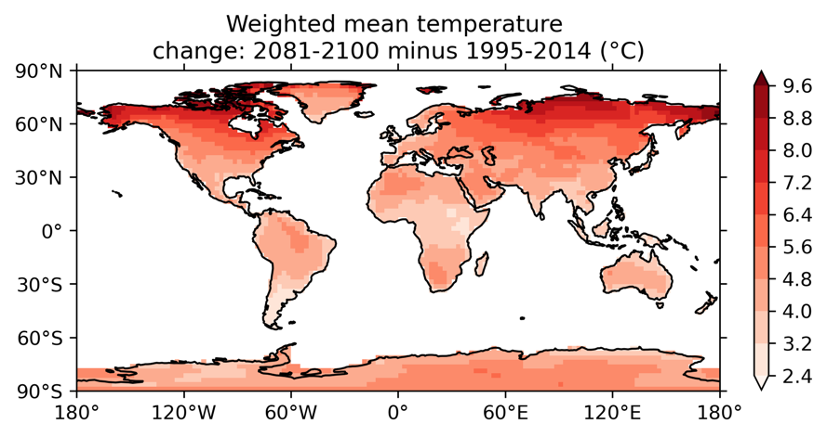Publishing the ETH Zurich climate model weighting method (ClimWIP) as part of ESMValTool

Change in the weighted multi-model mean surface air temperature over land (2081-2100 minus 1995-2014)
Through its commitment to open science, EUCP also aims to provide a legacy of code for future research and applications. One of the methods used in several studies within EUCP is the Climate model Weighting by Independence and Performance (ClimWIP) method. It provides flexible options to weight multi-model ensembles of global climate models, such as CMIP6, based on each models’ performance in simulating observed climatological fields, for example. The ClimWIP method, as well as so-called recipes to reproduce results from several studies, have recently been included into the Earth System Evaluation Tool (ESMValTool) in version 2.3.0. The results in these studies can serve as a starting point for users to develop their own applications.
The implementation of ClimWIP into the ESMValTool provides a range of benefits for scientists (working with the method or further advancing it) as well as for users:
- ESMValTool and the implementation of ClimWIP provide extensive documentation of the code and its functionality, including example results. This helps understanding, use, and further development of the method.
- Using the code to calculate model weights for a specific application is greatly simplified by building on the framework provided by ESMValTool
- The ESMValTool (and the ClimWIP method with it) can simply be installed via a Python package manager such as conda.
- A regular release cycle allows easy access to updates and further developments of the method
- Within EUCP, we have built a Python API for ESMValTool, so that the tool can also be used interactively in a Jupyter environment.
- ESMValTool comes pre-installed on several ESGF nodes. Users can log in to these nodes directly, without having to download data or install the software themselves. These compute resources are provided through the IS-ENES consortium.
- The ESMValTool provides input data quality checks as well as extensive options for automated pre-processing of the data (such as selecting time periods or regions, regridding, or averaging) which are then automatically passed to ClimWIP for further usage.
- The GitHub infrastructure around the ESMValTool provides transparency, as well as ensuring code quality and reliability through an internal review process of the existing code and potential future additions.



 Funded by the European Union under Horizon 2020.
Funded by the European Union under Horizon 2020.